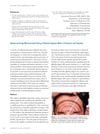1 citations,
December 2022 in “Archives of Dermatological Research” SVF injections improve hair growth and reduce hair loss in people with androgenic alopecia.
 December 2024 in “Research Journal of Pharmacy and Technology”
December 2024 in “Research Journal of Pharmacy and Technology” Androgenic alopecia is mainly caused by DHT, and new treatments focus on hair regeneration and aging factors.
 4 citations,
July 2021 in “International Journal of Environmental Research and Public Health”
4 citations,
July 2021 in “International Journal of Environmental Research and Public Health” Women who lost hair from childhood head radiation are more likely to face mental health issues than men.
 41 citations,
March 2007 in “Journal of dermatological science”
41 citations,
March 2007 in “Journal of dermatological science” Taking L-cystine and vitamin B6 can prevent hair loss caused by smoke in mice.
14 citations,
December 2021 in “International journal of molecular sciences” Growth hormone levels affect hair growth and loss, with too much causing excess hair and too little leading to hair loss.
 3 citations,
January 2019 in “Dermatology and therapy”
3 citations,
January 2019 in “Dermatology and therapy” Scalp massages may help stabilize or regrow hair in people suffering from hair loss, regardless of age, gender, or use of other treatments.
 36 citations,
January 2012 in “International Journal of Trichology”
36 citations,
January 2012 in “International Journal of Trichology” Losing eyelashes or eyebrows can be a sign of many different health problems and needs a careful approach to treat effectively.
 239 citations,
November 2000 in “Journal of The American Academy of Dermatology”
239 citations,
November 2000 in “Journal of The American Academy of Dermatology” Finasteride doesn't effectively treat hair loss in postmenopausal women.
 43 citations,
June 2016 in “Clinics in Plastic Surgery”
43 citations,
June 2016 in “Clinics in Plastic Surgery” The conclusion is that fat grafting is safe and effective but carries risks that need careful management.
 7 citations,
February 2019 in “International Journal of Dermatology”
7 citations,
February 2019 in “International Journal of Dermatology” Gray hair is caused by reduced melanin production or transfer issues, linked to aging and possibly health conditions, with treatments focusing on color camouflage.
 9 citations,
January 2015 in “Laboratory Animal Research”
9 citations,
January 2015 in “Laboratory Animal Research” Laminaria japonica and Cistanche tubulosa extracts combined may effectively promote hair growth.
 98 citations,
October 2012 in “Dermatologic Clinics”
98 citations,
October 2012 in “Dermatologic Clinics” Eating the right nutrients can improve hair health, but taking extra supplements usually doesn't help unless you have a deficiency.
 January 2025 in “Cosmetics”
January 2025 in “Cosmetics” Astragalus sinicus extracts may help promote hair growth and treat hair loss.
 6 citations,
January 2010 in “Springer eBooks”
6 citations,
January 2010 in “Springer eBooks” SA linked to mitochondrial issues and oxidative stress, while AGA involves disrupted hair growth genes.

Lamivudine might reverse hair graying and needs more research for potential treatments.
 6 citations,
October 2022 in “American journal of clinical dermatology”
6 citations,
October 2022 in “American journal of clinical dermatology” The review shows how to properly diagnose and treat the loss of eyebrow and eyelash hair.
 July 2024 in “Journal of Cosmetic Dermatology”
July 2024 in “Journal of Cosmetic Dermatology” Vegan collagen builder improves hair growth, skin smoothness, and reduces wrinkles and pain.
 5 citations,
September 2020 in “Molecules”
5 citations,
September 2020 in “Molecules” Extracts from three Polynesian plants were found to promote hair growth by affecting cell growth and gene expression related to hair.
 December 2023 in “Regenerative therapy”
December 2023 in “Regenerative therapy” miRNA-based therapies show promise for treating skin diseases, including hair loss, in animals.
 1 citations,
May 2016 in “Dermatologic Surgery”
1 citations,
May 2016 in “Dermatologic Surgery” The document concludes that using a phototrichogram with a protractor and tapeline is a reliable and noninvasive way to measure hair loss.
 9 citations,
July 2018 in “European journal of dermatology/EJD. European journal of dermatology”
9 citations,
July 2018 in “European journal of dermatology/EJD. European journal of dermatology” Disrupted sleep patterns can harm skin and hair cell renewal, but melatonin might help.
20 citations,
December 2017 in “Cardiovascular diabetology” Linagliptin slows down premature aging in certain mice.
88 citations,
June 2019 in “Cell reports” Certain small molecules can promote hair growth by activating a cellular cleanup process called autophagy.
 4 citations,
May 2020 in “International Journal of Women's Dermatology”
4 citations,
May 2020 in “International Journal of Women's Dermatology” Cow placenta lotion works like minoxidil 2% for female hair loss, with fewer side effects.
 2 citations,
September 2023 in “Aging”
2 citations,
September 2023 in “Aging” Elastic Net DNA methylation clocks are inaccurate for predicting age and health status; a "noise barometer" may better indicate aging and disease.
 1 citations,
December 2022 in “Biomolecules & therapeutics”
1 citations,
December 2022 in “Biomolecules & therapeutics” Minoxidil may help reduce aging effects in brain cells.
 1 citations,
July 2023 in “Cosmetics”
1 citations,
July 2023 in “Cosmetics” The new shampoo effectively delivers caffeine to hair follicles to help keep hair, especially as people age.
 January 2017 in “Journal of Investigative Dermatology Symposium Proceedings”
January 2017 in “Journal of Investigative Dermatology Symposium Proceedings” The 2015 Hair Research Congress concluded that stem cells, maraviroc, and simvastatin could potentially treat Alopecia Areata, topical minoxidil, finasteride, and steroids could treat Frontal Fibrosing Alopecia, and PTGDR2 antagonists could also treat alopecia. They also found that low-level light therapy could help with hair loss, a robotic device could assist in hair extraction, and nutrition could aid hair growth. They suggested that Alopecia Areata is an inflammatory disorder, not a single disease, indicating a need for personalized treatments.
 36 citations,
September 2009 in “Journal of Cellular and Molecular Medicine”
36 citations,
September 2009 in “Journal of Cellular and Molecular Medicine” New treatments targeting skin stem cells show promise for skin repair, anti-aging, and cancer therapy.
26 citations,
February 2022 in “Journal of pineal research” Melatonin affects skin and hair color and protects skin cells, with potential benefits for hair growth and skin health.
























